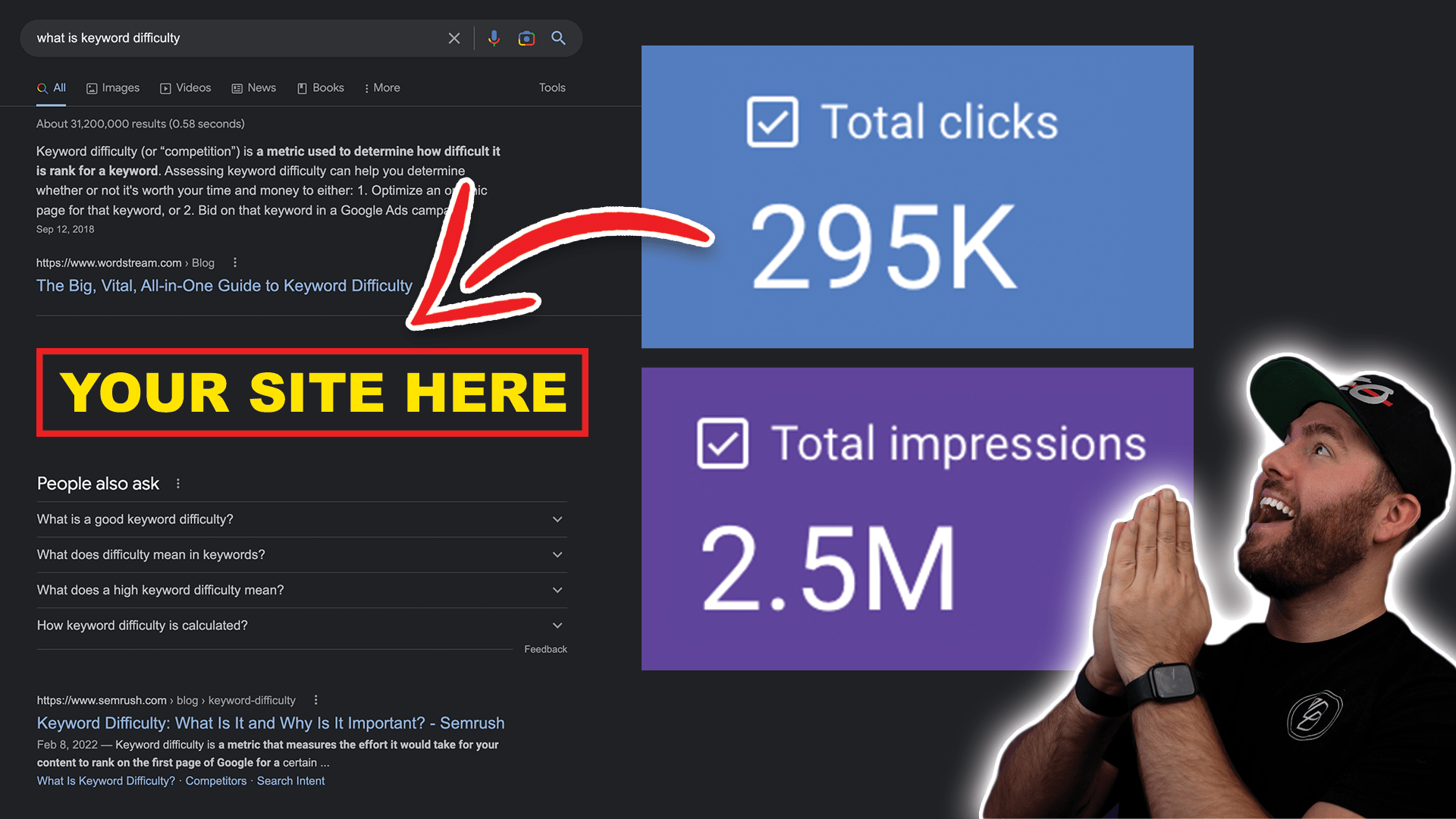While it’s relatively easy to find well-performing keywords to increase your website traffic, it’s difficult to foresee whether you’ll rank for them. That’s what a keyword difficulty score is for — they tell you how competitive any given keyword is so you can assess whether it’s worth using it in your own content.
However, KD scores aren’t entirely reliable. Learn more about keyword difficulty and how to use this metric for ranking higher on search engines.
What Is Keyword Difficulty?
Keyword Difficulty (KD) is a number from 0 to 100 that tells you how difficult it will be to rank at the top of Google search results for a specific keyword. Essentially, it tells you how competitive a keyword is. The higher the number, the harder it will be to rank for that keyword.
For example, the keyword “best search engine optimization” has a KD score of 90, meaning it would be very difficult to rank for it. That’s because so many other websites are using and already ranking for it.
The keyword “professional search engine optimization” has a KD score of 44, which isn’t low but it tells you that it would be easier to rank for it than the previous example. And if you wanted a keyword related to SEO that had a very low KD score, you could use “the 11 deadly sins of search engine optimization.” This query has a keyword difficulty of zero with 720 average monthly searches!
Keyword Difficulty as a Metric
While every keyword research tool has a KD score, they all calculate them differently, which is why the numbers will vary across tools. Some tools use a certain number of top-ranking pages for any given keyword and assess how many sites link to it.
The higher the number of links for a keyword, the higher the KD score. Other tools calculate their scores using a different way, so make sure to be aware of that.
Other Factors for Calculating Keyword Difficulty
These are the other factors that are used to calculate keyword difficulty:
- Domain rating
- Internal links
- Content length
- Relevancy
How these factors are used to calculate the keyword difficulty depends on who does the calculation. But generally, it’s the number of pages that a keyword has in the top 10 search results and its number of backlinks that will count.
The simple KD metric calculation mentioned earlier can be assessed as follows:
- KD 0-5: top-ranking pages hardly have any backlinks
- KD ~50: top-ranking pages have several hundred backlinks
- KD 90+: top-ranking pages have several thousand backlinks
Keyword Difficulty as a Concept
Although it’s unknown how Google ranks pages, we know what some of the most important factors for ranking are.
1. Number of Backlinks
Backlinks are like votes signaling to Google that one particular website is more valuable on a topic than its competitors. That means, the more backlinks you have, the better your chances to rank in the top 10 search results for your keyword of choice.
Some keyword research tools display a number under the KD score of a keyword to tell you how many backlinks to aim for. Keep in mind that not all backlinks are equal — the best ones are those from high-quality, established sources that Google already trusts and ranks high.
2. Authority of Competitors
Since it is believed that Google primarily values well-known, established websites, it makes sense to stay away from keywords that these rank for since you wouldn’t be able to compete with them.
While Google denies using sitewide authority metrics as part of its ranking algorithm, there are two methods by which a high website authority may achieve a high ranking on Google, albeit indirectly. These are:
A. Internal Links
A high domain rating (DR) refers to a website with a lot of strong pages that have high authority. The high-ranking site on Google may have a lot of “link juice” from these pages, which in turn makes it a high-authority page as well, even without backlinks.
B. Familiar Brand
Usually, people like to click on websites they’re familiar with when they have to choose from a list of search results. Google tracks this type of behavior to assess whether users are happy with their search results. If they are, these familiar websites may get a better ranking since they’re what people want.
3. Search Intent
Search intent refers to a searcher’s expectations every time they insert a query. Google wants to ensure it meets people’s expectations every time they use the search function — that’s why it’s important you’re aware of search intent when you choose your keywords.
Generally, searches are categorized into four search intent types: informational, navigational, transactional, and commercial. While some marketers analyze keywords for their ability to be informational, navigational, transactional, and commercially important, there’s another way to assess search intent.
By looking at the top-ranking pages for any given keyword and checking what you get from them, you’ll understand what intent searchers have.
For example, the keyword “keyword research” results in several “how-to” guides that explain how to best go about finding and using keywords. Now you know that that’s what searchers are looking for when inserting that keyword into Google.
Bottomline: simply browse top-ranking websites for any given keyword, analyze them, and then match the content that users expect from their search results.
4. Quality of Content
While many bloggers and SEO strategists believe that the longer and more detailed an article or blog post is, the higher Google will rank it, this belief is outdated.
Today, an article’s length doesn’t indicate its quality. A better approach than writing long articles is to write content that can provide more value in less time while remaining entertaining throughout.
To help you understand this better, ask these questions when analyzing the content quality of the top-ranking websites for your target keyword:
- Is the information presented accurate and up-to-date?
- Is the article written by an expert on the subject matter?
- Is the information unique?
- Is it properly formatted?
- Is it well-written?
- Is it well-designed?
While all these factors matter, the first three are the most important ones. Google cares about providing users with up-to-date and accurate information from reliable sources. In short, it wants you to provide expertise, authoritativeness, and trustworthiness. Focus on those aspects instead of writing longer articles with the hope of ranking higher.
What Is a Good Keyword Difficulty Target?
There are a few factors that determine what keyword difficulty you should target, including:
- The authority of your website
- The credibility of your topic of choice
- Your ability to get backlinks
- The ability and/or resources to meet the search intent
Use your keyword research tool to check for the keywords that your website is currently ranking for. To find out which ones those are, simply type in your domain into your keyword research tool and look at the organic keywords report.
Although this is useful to do, you should never do it instead of, but always in addition to the process above. The best way to know what your chances of ranking for a keyword are is to study the top-ranking websites, look at what they offer, and take your own resources and skills into account.
Also, remember to use some high-KD keywords. It may take time, rewrites, and promotion to get you to rank for these, but using high-KD keywords are worth inserting into your content as the sooner you start using them on your website or blog, the sooner they’ll help you rank.
Final Thoughts
If you want to know how to rank higher on Google, you need to study all things SEO keywords. Marketers, businesses, website owners, and bloggers primarily use keywords to drive organic traffic to their pages and you should too.
One way that you can choose keywords is by looking at the keyword difficulty or KD metric. Although this value cannot precisely predict your chances of ranking for a keyword, it can give you an idea of how competitive it is.
In addition, always study the top-ranking websites for the keywords you’re trying to rank for and take the topics they use as a benchmark for your own content.

